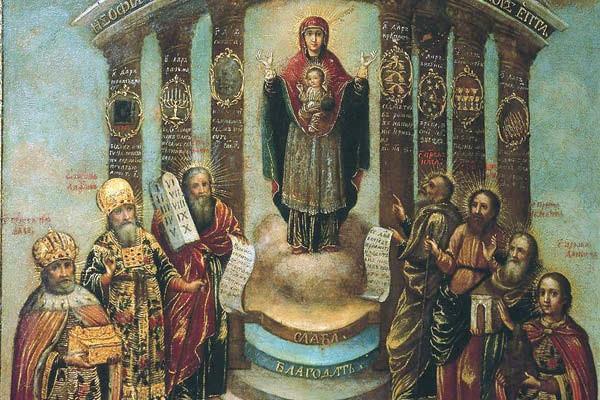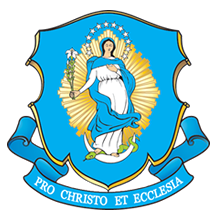
I express my heartfelt congratulations to Fr. Dos Santos who presents each essay with a scriptural basis, official Catholic doctrine, the teachings of the magisterium, and the Code of Canon Law. He considers each theme with an overarching perspective that enables the reader to go beyond the knowledge they currently possess to the wisdom God offers through the teachings of the Catholic Church.
The Most Rev. Antonysamy Savarimuthu, DD, DCL, Bishop of Palayamkottai, Tamil Nadu, India, has written the following review of Hagia Sophia: The Wisdom of God as Offered to the Modern World, a collection of essays written by Fr. Kenneth M. Dos Santos, MIC. The book is published by Marian Heritage and available for purchase.
In this present advanced age of information and technology, knowledge is attainable easily on any subject with the use of modern technologies. Does the possession of knowledge ipso facto guarantee wisdom? One can have knowledge without wisdom, but one cannot have wisdom without knowledge. While knowledge provides a familiarity with facts, or certain subjects, wisdom goes beyond facts and requires the pulling together of knowledge and personal experiences, enabling one to recognize what is true, good, and beautiful.
Rev. Kenneth M. Dos Santos, MIC, draws the attention of the audience to Holy Wisdom, the Wisdom of God as it is received by us through the doctrine and magisterial teaching of the Catholic Church. His book, Hagia Sophia: The Wisdom of God as Offered to the Modern World, contains a collection of six essays that shed light upon certain aspects of faith in the Christian life. The first four essays reveal the wisdom God offers mankind, in the reception of four Sacraments: Marriage, Eucharist, Reconciliation, and Holy Orders. The fifth essay speaks about the Mother of God, the Blessed Virgin Mary, the faithful and loving servant who possesses a humility unlike any other. The sixth and final essay is concerned with the unity and peace achieved by Christ the Lord.
God having created man male and female exhorts a communion of spouses in a matrimonial bond, equal and complementary to each other. Marriage, which is by nature ordered to the well-being of the spouses and to the procreation and upbringing of children, is raised to the dignity of a Sacrament by Christ the Lord for the baptized. This dignity of the Sacrament of matrimonial union calls for the unity, indissolubility, and fidelity of spouses to each other.
God in His fullness of mercy and love is patient, slow to anger and merciful to those who are repentant for sin, and yet this does not mean that justice will be precluded for the unrepentant, those who remain steadfast in their sins. God's mercy includes the acts of correction and admonishment. Thus, the Eucharist offered by our Lord as the sign of mercy must be received with all worthiness. Those who are leading a life contrary to Gospel values, or uphold a doctrine against the teaching of the magisterium, exclude themselves from reception of the Eucharist.
The Sacrament of Reconciliation, through which we receive forgiveness, the mercy of God, His grace, healing, and transformation, is administered by a validly ordained priest who has the faculty to celebrate this Sacrament. Exposing the requirements for a penitent to receive forgiveness, the author brings out the mercy of God by taking up an in-depth study of the parable of the Prodigal Son. If our Lord has been so gracious in forgiving our transgressions, who are we to withhold forgiveness from our brothers and sisters in Christ?
In the gathering of the twelve apostles at the Last Supper, Jesus instituted the Sacrament of Holy Orders by ordaining them priests to carry out His ministry; to confect and offer His body and blood for the food of all the faithful. If Christ has instituted the Sacrament of Holy Orders as being conferred only on men, it is not up to mankind or the authority structure of the Roman Catholic Church to change this. The author strengthens the teaching found in the Code of Canon Law (can. 1024) with the statement of Pope Saint John Paul II, who expressed the inability of any Church authority whatsoever to confer priestly ordination on women in his apostolic letter Ordinatio Sacerdotalis. Moreover, explaining the matter and form of the Sacrament of Holy Orders and that of the Eucharist, the author brings out the rapport which exists between these two Sacraments.
The fifth essay concerns the Blessed Virgin Mary, who received the greeting from the Archangel Gabriel, "Hail, full of grace, the Lord is with you." With this greeting, it is shown that Mary surpasses the angels, who are greater than man in dignity, in close association with God and in the fullness of divine grace. Her exceeding greatness shines out in her humility and selflessness as she puts herself at the service of others. She is not only a mother, but also an advocate who purifies, embellishes, and makes acceptable [by her prayers] all that we give to our Lord.
The sixth and final essay considers the unity and peace of mankind and the whole of creation. After elucidating how the fall of man - the original sin - disfigured the authentic and original unity and peace that prevailed at the time of creation, the author proceeds to illustrate a reconciliation that is brought about by Christ, the Second Person of the Holy Trinity - necessarily one in nature, substance, and essence with God the Father and the Holy Spirit. He, being unity itself, becomes the origin and source of all unity and the fullness of peace. This mission of unity and peace is wrought out in society today through the Church, the spotless bride of Jesus Christ.
I express my heartfelt congratulations to Fr. Dos Santos who presents each essay with a scriptural basis, official Catholic doctrine, the teachings of the magisterium, and the Code of Canon Law. He considers each theme with an overarching perspective that enables the reader to go beyond the knowledge they currently possess to the wisdom God offers through the teachings of the Catholic Church.
I pray that all who read this book achieve wisdom and enjoy a personal relationship with Jesus Christ, the Redeemer and Savior of the World.
{shopmercy-ad}
















